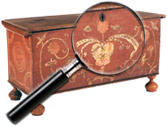|
|
Suzani Textile – Central Asian
Suzanis are embroidered and decorative tribal textiles made in Tajikistan, Uzbekistan, Kazakhstan and other Central Asian countries, usually silk embroidery on cotton panels that could then be sewn together. They were were used in homes as wall decoration, bed covers or rugs, and traditionally made by young women to be given to their groom on the wedding day as part of their dowry.
Reference note by p4A editorial staff, July 2011.
J.P. Ball, African-American Photographer
J.P. Ball, a noted African American photographer, opened his first studio in Cincinnati, OH in 1845, then became an itinerant photographer, traveling to Pittsburgh, Richmond, and throughout Ohio. He eventually resettled in Cincinnati in 1849 and opened a Daguerrian Gallery downtown, which subsequently became one of the most well known galleries in the U.S. During the early 1850s, when Ball opened an additional gallery in Cincinnati, he hired his future [...] Click here to continue reading.
The Phyllis Ritvo Collection of Gouda Pottery
A graduate of Wellesley College with a graduate degree from Northeastern University, Phyllis began collecting Gouda pottery in 1962, when she bought her first piece in an antiques shop for $27. Her growing obsession with both the pottery and its history took her to museums, libraries, and shows throughout the United States and the Netherlands. With the aid of many antiques shows, auctions, and later the internet, [...] Click here to continue reading.
Demijohn & Carboy Bottles
Demijohns and carboys are large generic glass bottles used for both shipping and selling liquids in bulk. Although the terms are sometimes used interchangeably there is a difference. Demijohns were typically used for wine and spirits while carboys were associated with corrosive liquids like acid or those related to the pharmacy and medical fields. Both types of bottles were most often encased in wicker or wood crates to protect against breakage.
Archive of Colonel Joseph C. Audenried
Born into a well to do Philadelphia family, Joseph C. Audenried (1839-1880) enjoyed a privileged seat at the table of history. Handsome, intelligent, and supremely efficient, he made the most of his innate talents and good fortune as he built a truly unique career, becoming one of the most trusted members of the staff of Maj. Gen. William T. Sherman.
A career military man, Audenried graduated 17th in [...] Click here to continue reading.
Kady Brownell
Kady Brownell (born 1842), nee Southwell, was born in an army camp on the coast of Africa, but when her mother died shortly after her birth, she moved to Providence, Rhode Island and was raised by family friends. In the early 1860s, Kady worked as a weaver in the mills, where she met and fell in love with Robert Brownell. In 1861, with the start of the Civil War, Robert joined the [...] Click here to continue reading.
Henry Lawrence Faulkner (American, 1924 to 1981)
Henry Lawrence Faulkner was born in Falling Timber, near Egypt, Kentucky. His flamboyant lifestyle carried him from a traumatic childhood in rural Kentucky through a bohemian existence in New York, Los Angeles, Key West and Sicily. His most pronounced traits–artistry, poetry, reverence for nature, love for animals, his restlessness and disdain for social convention, shaped him from early life. Faulkner was the eccentric rebel who brought his [...] Click here to continue reading.
Roseville Pottery Zephyr Lily Pattern
Roseville’s Zephyr Lily pattern presents one or two lilies on tall stem surrounded by long, slender, arching leaves on background of concentric circles, 1940′s. Colors include Bermuda blue, evergreen, and sienna tan (often called brown). Mark: Roseville in relief. 48 total shapes: 39 used once, five used twice. Two shapes, the jardiniere (#671) and the teapot set (#7) came in three sizes or configurations. The pedestal and a 4.50″ [...] Click here to continue reading.
Roseville Pottery White Rose Pattern
Roseville’s White Rose pattern presents one, two or three five-petal old garden roses with multiple small leaves above and below, 1940′s. Backgrounds are blue, brown/green, and pink/green. Mark: Roseville in relief. 60 total shapes: 52 used once with five used twice. One shape, #1, was used for the teapot, cream and sugar. Shape #653, the jardiniere, came in six sizes. Only the pedestal was unnumbered. Watch for fake brown, [...] Click here to continue reading.
Roseville Pottery Water Lily Pattern
Roseville’s Water Lily pattern presents a large flower with frilly yellow center on large lily pad with bud and other pads on wavy, water-like background, 1940′s. Colors are tan/brown with yellow flower; blue with white flower, and pink/green with pink flower. Mark: Roseville in relief. 54 total shapes: 45 used once and five used twice. The jardiniere, shape #663, came in five sizes. The hanging basket and the small [...] Click here to continue reading.
|
Recent Articles
- Charles Alfred Meurer – American Artist & Tromp L’Oeil Artist
- Sendak, Maurice – American Artist & Writer
- Godie, Lee – American Artist
- Davis, Vestie – American Artist
- Bartlett, Morton – American Artist
- Mackintosh, Dwight – American Artist
- Evans, Minnie Jones – African-American Artist
- Mumma, Ed (Mr. Eddy) – American Artist
- Nice, Don – American Artist
- Savitsky, John (Jack) – American Artist
- Gordon, Harold Theodore (Ted) – American Artist
- Dial, Thornton – African-American Artist
- Doyle Sam – American Artist
- Johnson, Lester Frederick – American Artist
- Finster, Howard – American Artist
|
|
